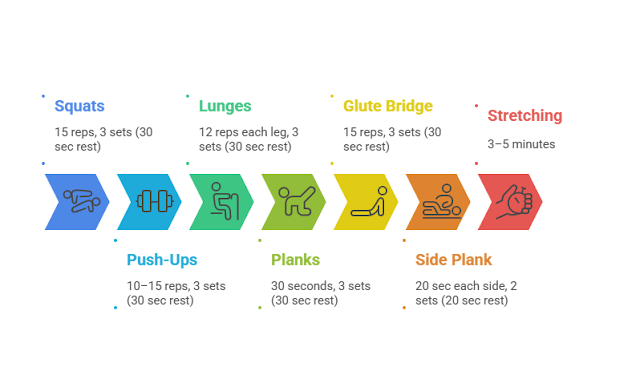Part 2: Sculpt Your Body at Home! Upper, Lower & Core Training
A 20-Minute Full-Body Home Workout Routine
Even on a busy schedule, you can strengthen your upper body, lower body, and core muscles at home with this simple 20-minute home workout routine. No equipment is needed—your bodyweight is more than enough for effective results. Follow this practical guide to get started today.
Upper Body Power: Focus on Arms, Shoulders, and Chest
- Push-Ups: The most basic and effective upper body exercise. Place your hands shoulder-width apart, keep your body straight, and bend your elbows to lower and lift your body. If it's too challenging, start on your knees.
- Triceps (Diamond) Push-Ups: Bring your thumbs and index fingers together to form a diamond shape, and do push-ups. This variation targets the triceps at the back of your arms.
- Arm Circles & Shoulder Taps: Rotate your shoulders in circles to warm up, or try shoulder taps from a push-up position to boost core and shoulder stability.

Tone Your Legs and Glutes: Essential Lower Body Routine
- Squats: Stand with your feet shoulder-width apart, lower your hips as if sitting back in a chair, then stand up. This works your thighs, glutes, and calves.
- Lunges: Step one leg forward and bend both knees to 90 degrees. Switch sides for 10–15 reps each.
- Bridges (Glute Bridge): Lie on your back with knees bent, lift your hips to work your lower body and core at the same time.
- Jump Squats/Side Lunges (Optional): For extra intensity, add jump squats or side lunges to challenge yourself.
Planks and Core Moves for Stability
- Plank: Hold your body straight on your elbows and toes for 20–30 seconds, making sure your back stays flat.
- Side Plank: Lie on your side and support your weight with one elbow and your feet, strengthening your obliques and core.
- Bird Dog/Superman: On all fours, extend the opposite arm and leg and hold for 5 seconds. Excellent for your back, core, and balance.
- Leg Raises: Lying on your back, slowly lift and lower your legs to engage your lower abs.

20-Minute Circuit Example
.png)
- Take short breaks between sets to avoid burnout.
- Adjust reps and sets to your fitness level. Beginners can reduce reps, and advanced users can add more sets or intensity.
Tips for At-Home Practice
- Aim for 3–4 sessions per week for noticeable results.
- Warm up and cool down to reduce injury risk.
- Listen to your body and adjust intensity to avoid overexertion.
- Beat boredom with music, workout videos, or by exercising virtually with friends.

FAQ: All About Muscle-Specific Home Workouts
Q. Can a 20-minute workout routine at home be effective?
A. Yes, when done consistently, a 20-minute routine can significantly improve strength and fitness. The key is to make it a regular habit.
Q. Do I need to include all muscle groups in every routine?
A. Targeting all major muscle groups (upper body, lower body, core) promotes balanced strength and helps prevent injuries. Including a variety of moves produces the best results.
Q. What if I get tired during my workout?
A. Reduce the number of reps and sets or switch to easier variations (like knee push-ups or modified planks). Pause and rest if you feel any pain; safety and persistence matter most.
References
- Healthline (30 Moves to Make the Most of Your At-Home Workout)
- Nerd Fitness (Best at Home Workouts Without Equipment)
- Nike (How to Exercise at Home With No Equipment)
Just 20 Minutes a Day Can Transform Your Body
Home workouts that target your entire body don’t require expensive equipment or a lot of time. Dedicating only 20 minutes a day can lead to a stronger, healthier, and more energetic you. In Part 3, we’ll share tips and strategies for making your workout routine fun and sustainable—stay tuned!
Where Should You Begin Exercising at Home?
A 20-Minute Full-Body Home Workout Routine
How to Keep Home Workouts Enjoyable and Sustainable




